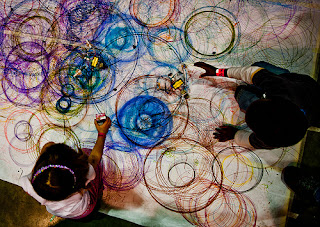Making your way in the world today takes everything you've got.
Taking a break from all your worries, sure would help a lot.
Wouldn't you like to get away?
Sometimes you want to go
Where everybody knows your name,
and they're always glad you came.
You wanna be where you can see,
our troubles are all the same
You wanna be where everybody knows
Your name.
You wanna go where people know,
people are all the same,
You wanna go where everybody knows
your name.
…Original and full length lyrics for “Where Everybody Knows Your Name,” the theme song from the 1980s television sitcom “Cheers,” was written by Gary Portnoy and Judy Hart Angelo.
My colleague, Dan McDonald, master teacher and kid-magnet extraordinaire, came up with a darn good concept one day. He said we need "Norm schools..." the kind where "
everybody knows your name," and not just during regular school hours. Dan is the kind of teacher who knows the value of making meaningful connections with students over time by first getting to know their
personal learning stories. Some kids' stories read more happily than others, and he knew that without that connection, scholastic success was but a dream, especially for the kids from at-risk environments that he typically supported in his role as an
alternative teacher.
Dan wondered out loud what our educational environment would look, sound and feel like if every person that worked in a school, metaphorically speaking,
knew the name of every kid who attended that school... and of course he didn't mean that they should memorize the yearbook. He meant knowing their names in the sense that the characters from
'Cheers' knew Norm's name, and everyone else's in the bar... that '
Cheers' was like home for many of them, and the patrons like family. The names were associated with each character's deeper being; their identities and perspectives toward the daily challenges that formed the story-lines of the show. The bar was a place for them to feel accepted- a sense of belonging, and perhaps a place where they were comfortable being vulnerable as they shared their troubles and flaws with each other. He thought that schools should be this type of environment.
He wondered further how schools could become more welcoming and open to students who are vulnerable, flawed and dealing with problems... environments where they feel that sense of belonging allowing them to share their challenges with significant, supportive others knowing that they won't be judged or categorized. To nurture this sense of belonging, he pondered why schools shut their doors for all intent and purposes at 4:00 PM, and don't effectively open up again until 7:00 AM the next day. There are many reasons to leave school buildings open after regular school hours, but Dan was interested really in just one. He figured that one way to facilitate a deep, meaningful and positive connection to school would be to leave the doors open into the evenings each day. He had brilliant ideas about school partnerships with social service and helping agencies whereby programming and services for youth would be carried on right where school left off every day. He understood that for some, school is the only safe and nurturing environment kids know... why not allow them the privilege of being in that safe place as much as possible? Why not source agencies and people who would be willing to collaborate with educators to support kids in the evenings in this way? I think Dan was on to something with these questions.
Take some time to think about what kind of school you work at, or what kind of school your kids attend. Is it the kind where kids feel a sense of belonging, safety and care... like family, or is it some other kind of school? If it is some other kind of school, perhaps ask yourself what you can do to change that feeling.




